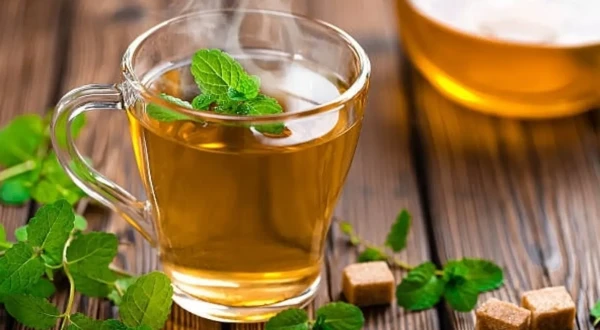Green Tea 10 Benefits, Side Effects, Caffeine
Green Tea Nutrition

| Green Tea (100g) Nutrition | |||
| Carbohydrate | Protein | Fat | Calories |
| 0.3g | 0.1g | 0.1g | 12kcal |
| Main Nutrition | Catechin, vitamins A, B, E | ||
| Main Benefits | Prevention of soothing effects and heart disease prevention, constipation prevention | ||
| Side Effects | Excessive intake may cause abdominal pain, diarrhea, insomnia, and indigestion. | ||
One of the healthiest beverages on earth, energizing green tea can be steeped into tea or consumed whole in powdered form. Aside from drinking green tea, you can also use it in smoothies, oatmeal, etc. Green tea contains polyphenol antioxidants that reduce inflammation in the body, which is known to cause premature aging. These antioxidants protect cells from damage that can lead to chronic disease and are one of the ingredients that make green tea a superfood.
green tea benefits

1. Improve brain function
Green tea offers caffeine, but it contains an amino acid called L-Teanine. The combination of caffeine and L-theanine may optimize brain function, resulting in increased working memory and improved mood. It can also help with the function of mental and physical stability by slowing down the caffeine absorption time.
2. Dementia prevention
Green tea acts as a powerful protector against neurodegenerative diseases, including Alzheimer’s and Parkinson’s disease, along with improving brain function. This is mainly due to the antioxidant catechin content, which may improve cognitive ability by protecting brain cells.
3. Increased bone density
The antioxidant properties of green tea have been shown to prevent bone loss and reduce the risk of fractures. Consistently consuming about 2 cups a day will improve bone strength and quality, thereby contributing to bone health. It is also rich in polyphenols, which have a positive effect on increasing bone density by preventing oxidative damage to bone-related cells and reducing inflammation to support bone formation.
4. Prevent heart disease
Antioxidants polyphenols and catechins perform several tasks. One of them has been shown to protect the heart by reducing total cholesterol, or bad LDL cholesterol, and triglycerides. It can also lower blood pressure and significantly reduce the risk of various heart diseases by preventing the oxidation of LDL, a process that causes a domino effect that contributes to arteriosclerosis and various heart diseases.
5. Skin Health
Additionally, large amounts of vitamins are very good for the skin, and green tea has so many health benefits for the skin that it can be used in cosmetics. It is mainly effective for refining skin texture or whitening the skin. Using green tea cosmetics after washing your face can have a very positive effect on your overall skin health. It can also curb hair loss and promote scalp health.
6. Anticancer activity
Cells naturally accumulate oxidation damage among regular cell metabolism. A class of molecules called antioxidants can prevent or mitigate this damage. Green tea, which contains powerful antioxidants, has been shown to slow or inhibit the growth of several cancer tumors, including breast and prostate cancers.
7. Diet
Green tea contains catechins, which have a diuretic effect that helps expel waste from the body. This may help with diet. Additionally, a small amount of caffeine helps energize the body and prevent constipation. Consuming green tea while dieting can prevent constipation and help you drink enough water. It can also help eliminate mild swelling that occurs when you wake up in the morning.
8. Anti-inflammatory effect
Green tea contains many powerful antioxidants. These ingredients are effective against inflammation and are also effective against arthritis, gastritis, and enteritis.
9. Diabetes relief
Catechin, a powerful antioxidant polyphenol, can lower fasting blood sugar levels and is very effective in controlling blood sugar levels. Consuming green tea can make blood sugar management easier for people with diabetes.
10. Hangover relief
Green tea’s diuretic effect helps break down alcohol in the body and can quickly relieve hangovers. This can reduce the burden on the liver and promote liver health.
Green tea, matcha, black tea difference
Green tea, matcha, and black tea are all made from tea trees and can be divided according to oxidation and processing methods. Green tea does not oxidize, so it maintains its green color and is lightly brewed or steamed before drinking. Matcha is made by grinding tea leaves and mixing them with hot water. Black tea is tea that has oxidized and turned brown and is steeped in hot water. Green tea (28mg) contains the least amount of caffeine in one cup, followed by matcha (30mg) and black tea (47mg).
Can I drink it instead of water?
Green tea contains a small amount of caffeine, but the caffeine can be neutralized to some extent through flavonoids. However, excessive consumption can cause insomnia and dehydration due to the excessive diuretic and caffeine effects. Therefore, it is not suitable for drinking instead of water.
Side Effect
- Insomnia, anxiety – Contains a small amount of caffeine, so excessive consumption may cause symptoms such as insomnia and anxiety.
- Abdominal pain, diarrhea – It has a cold nature, so if a person with a cold body consumes too much, symptoms such as abdominal pain and diarrhea may occur.
- Indigestion – Drinking green tea right after a meal may interfere with the absorption of proteins and other nutrients, causing indigestion.
- Caution for pregnant women – It can reduce the absorption of iron and folic acid, so menstruating and pregnant women are advised to avoid taking it.
- Heart palpitations – Excessive consumption may cause heart palpitations due to the action of caffeine.
References
🔹Good Food: Top 10 health benefits of green tea🔹Health: Green Tea: 10 Benefits, Plus Tips🔹WebMD: Are There Health Benefits to Drinking Green Tea?